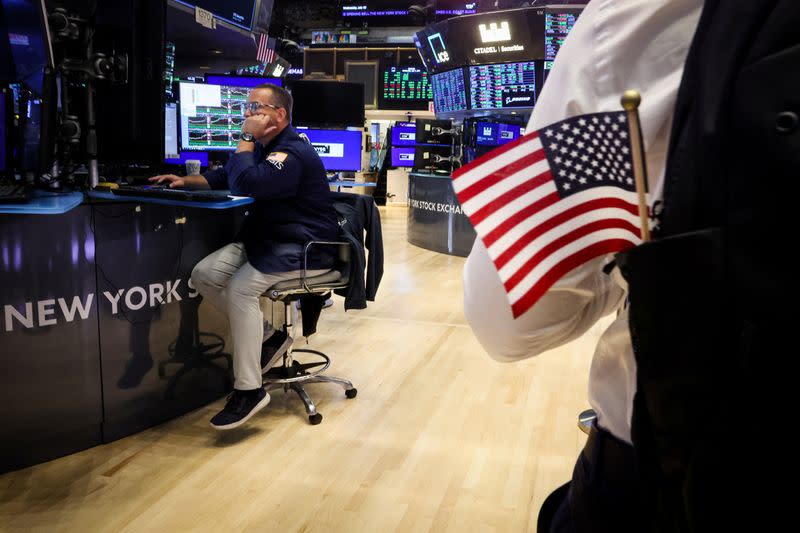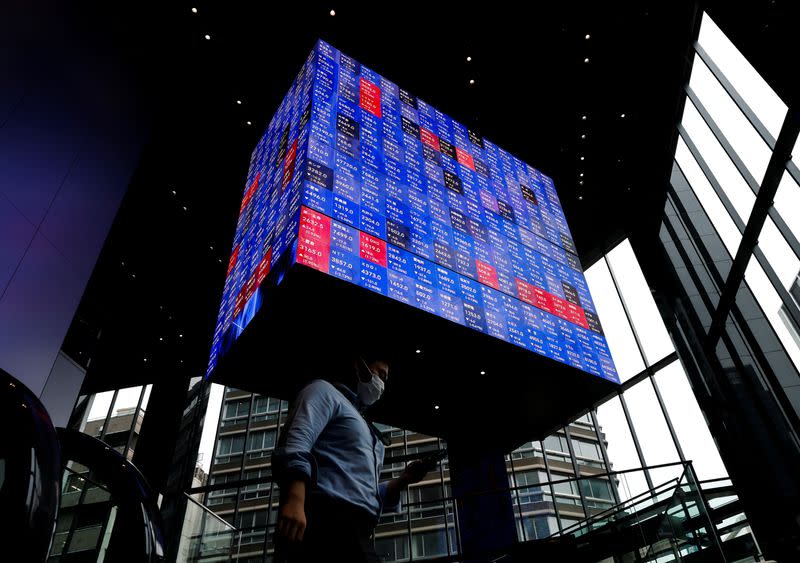Shares climb, oil slips amid Mideast risks and looming Nvidia earnings
By Chibuike Oguh and Iain Withers
NEW YORK/LONDON (Reuters) -A gauge of global shares climbed in choppy trading while oil prices slipped on Tuesday as investors weighed geopolitical risks as well as impending Nvidia earnings and U.S. inflation data.
Markets are anticipating an imminent start to the Federal Reserve's monetary policy easing, after Chair Jerome Powell said on Friday the central bank was ready to start cutting rates.
Wall Street's main indexes ended higher in choppy trading, with the Dow Jones Industrial Average adding 0.02% to 41,250.50, the S&P 500 gaining 0.16% to 5,625.80 and the Nasdaq Composite rising 0.16% to 17,754.82.
European stocks finished up 0.16%, following a late rally in Japan's Nikkei index, which ended 0.47% higher. MSCI's all-country index of stocks <.MIWD00000PUS > was up 0.15% at 831.24.
Gold traded above $2,500 per ounce on rate cut expectations and lingering concerns about the Middle East conflict, exacerbated by a major missile exchange between Israel and Hezbollah on Sunday.
Middle East tensions - along with concerns about a potential shutdown of Libyan oil fields - had led to a surge in oil prices of more than 7% over the previous three sessions. However, that rally lost steam on Tuesday, with a slight dip in prices. [O/R]
Investors were also on edge ahead of Nvidia's earnings report on Wednesday, where anything short of a stellar forecast from the chipmaker could jolt investor confidence in the AI-fuelled rally.
"I think the big story today is what's going to happen with Nvidia tomorrow, and this seems to be like what everybody is poised to react and nobody wants to really commit one way or the other," said James St. Aubin, chief investment officer at Ocean Park Asset Management in Santa Monica, California.
"Nvidia is almost 5% of the S&P 500 earnings contribution and almost 7% of the market cap weight so it's significant in terms of its influence of the overall market."
U.S. consumer confidence rose to a six-month high in August although Americans are becoming more anxious about the labor market, data showed on Tuesday.
The dollar index, which measures the greenback against a basket of currencies including the yen and the euro, fell 0.3% at 100.55, with the euro up 0.21% at $1.1184.[FRX/]
Personal consumption expenditures (PCE) price index, a key U.S. inflation measure that is preferred by the Fed, is due on Friday and could further influence market perceptions of how quickly the central bank officials will act.
The yield on benchmark U.S. 10-year notes rose 1.5 basis points to 3.833%. Investors are betting on either a 25-basis point or a 50-basis point interest-rate cut in September, with odds of a 25-bps cut at about 71%, while odds of a 50-bps cut are at about 29%, according to CME Group's Fed Watch tool.
"I think 25 bps is locked and loaded in terms of the market expectations at this point, but the question is, is 50 bps on the table?" St. Aubin added.
Also keeping sentiment in check was a move by Canada, following the lead of the United States and European Union, to impose a 100% tariff on imports of Chinese electric vehicles and a 25% tariff on imported steel and aluminium from China.
Oil prices fell, with Brent futures settling down 2.3% at $79.55 a barrel, while U.S. crude fell 2.4% to $75.53.
(Reporting by Chibuike Oguh in New York and Iain Withers in London; Editing by Deepa Babington and Marguerita Choy)


